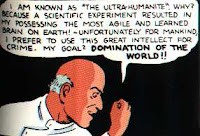Formalism and structuralism both focus on the work of art as an object independent from the people or the world that created them. But plenty of kinds of criticism does care about things outside the work of art as an artifact. The biography of the authors, the historical moment out of which the work arose, the influences upon the work and its influences on other works, all of these focus outside the work itself.
Superman arose out of a specific historical moment.
As you may know, Superman was created by artist Joe Shuster and writer Jerry Siegel. In 1938, when the first Superman comic was published in Action Comics #1, Siegel and Shuster were both 24 years old, and they'd been working together on Superman for at least five years. Their first published Superman work was their short story "The Reign of the Superman", published in a 1933 fanzine. That original story featured a bald "Superman" bent on world domination: recognizable now as an early version of the Ultra-Humanite, who was himself an early version of Lex Luthor.
The origin of the name "Superman" is up for debate, but in the 1930s there was another historical movement using the same term. Adolph Hitler (who became chancellor of Germany in 1933) was strongly influenced by his reading of Nietzsche and by the idea of the Ubermensch, which in English translations of the day was given as "Superman". Hitler considered himself to be the Superman, who by strength of will could, and SHOULD, overcome lesser men and exert his power. Hitler, of course, applied Nietzsche's ideas along racial lines, and considered the Arians to be a race of Supermen, who would use their will to dominate lesser races.
Siegel and Shuster, Harry Donenfeld, Jack S. Liebowitz, Sheldon Mayer, (not to mention Bob Kane, Will Eisner, Jack Kirby, Stan Lee) were all Jewish. Though Siegel has said that he never read Nietzsche and he wasn't thinking of Hitler, in 1938 a Jewish-American community created and published a story about a dark-haired alien* Superman who used his power not to dominate but to protect the weak, and who exerted his power on behalf of so-called "lesser men". Superman's first acts in the comics include saving a woman wrongly accused of murder, stopping a man from beating his wife. Whether his creators intended him to be such or not, then, Superman is a direct refutation of the Nazi idea of the Ubermensch.
*We should understand "alien" not only as a science-fiction designation, but as a racial one. Superman is defined as an outsider. He's not an Arian, but he's not Jewish either, exactly. He's a stranger in a strange land--though that is itself a designation that has often historically been adopted by or thrust upon Jewish people.


No comments:
Post a Comment